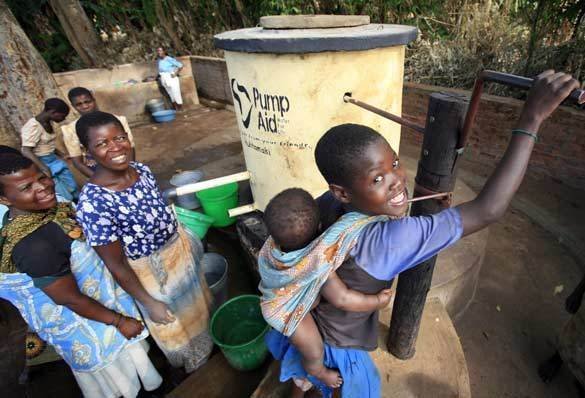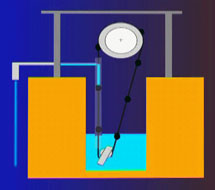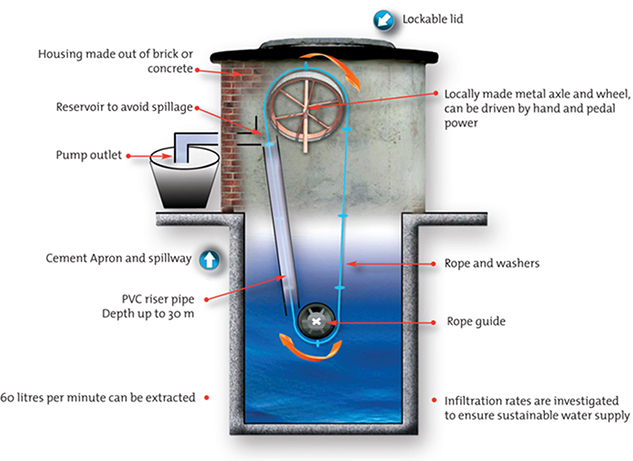Elephant pump
| |
|
|
|
|
|
|
|
|
|

The Elephant Pump, designed by Pump Aid based on a 3,000-year-old Chinese design, is built from rope, a plastic pipe, some rubber washers, and a winding wheel. The name "Elephant Pump" refers to the device's strength, shape, and reliability. The pump can lift water from depths of 50 meters (160 ft), and can produce 1 litre (0.26 US gal) of water per second.
The Elephant Pump's design won the 1995 St Andrews Prize for the Environment for Pump Aid. The World Bank awarded a Development Marketplace grant in the amount of 120,000 United States dollars to Pump Aid in 2006, funding 1,000 pumps and enabling the development of the Elephant Toilet. The Elephant Pump has now provided over 1 million people in rural areas of Zimbabwe and Malawi with clean, safe water. Elephant Pumps can be maintained by poor rural communities without any assistance.
Pumps are built in response to grassroots demand and in full consultation with the local community. The local community come together to assist in the building process, providing materials such as bricks, sand, stones and unskilled labour. The Elephant Pump can also supply water for irrigating nutrition gardens where communities can grow crops to improve their diet and sell the surplus.
Pump Aid believes that each pump is at the heart of sustained water and sanitation improvement.
Each pump we build addresses all the needs at installation point and for lifetime stewardship, including:
- Pump Build
- Community engagement
- Embedded sanitation change
- Sustainability of clean water
- Impact assessment.
The Elephant Pump has helped to deliver clean water to over 1.1 million people since 1998, building over 8,000 pumps across 3 nations; Malawi, Zimbabwe and Liberia.
Contents
Construction, operation and maintenance

To break the cycle of poverty in Africa, access to clean water for drinking and water for irrigation must be improved. Pump Aid builds appropriate technology water pumps, called Elephant Pumps that can be maintained by poor rural communities without any outside assistance. Using technology that has local currency, the well is built with local sand, stone and handmade bricks. The rope plugs, integral to the design, are made by melting and moulding local waste plastics.
build an Elephant pump

Costs
The cost of an Elephant Pump includes a full range of programme activities from installation to community training. A single pump serves a community of up to 120 people and costs on average about £3,000.
Manuals, videos and links
- Elephant Pump Wins Award. July 2005.
- Zimbabwe – Elephant Pump prevents water contamination. WASHplus, 2010.
- Functionality and water quality of Elephant pumps: Implications for sustainable drinking water supplies in rural Malawi Groundwater for Sustainable Development, Volume 1, Issues 1–2, November–December 2015, Pages 129–134
Pump Aid in Malawi
Acknowledgements
- Pump Aid. Wikipedia.
- Elephant Pump Wins Award. July 2005.
- The Elephant Pump. Blog, by Aqua Aid. UK.
